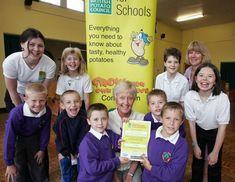
The Grow Your Own Potatoes (GYOP) campaign was open to the country’s primary schools and was designed to inspire and motivate children to discover more about the food they eat by growing a potato plant.
To take part, teachers were asked to register via the internet at www.potatoesforschools.org.uk and the website then delivered supporting materials in the form of project resource sheets and teaching aids devised with the help of educational experts to fit with the National Curriculum. Growing kits, supplied by WCF-Phoenix, Westland Horticulture and Cygnet PB, and planting tips were sent out to more than 420 participating schools nationwide and children were also able to compare their plant with one being grown by the BPC via a web cam.
Many schools were recruited as a direct result of levy payers delivering flyers or telling their local school about the competition. There were also some offers of help from levy payers and other related organisations. These included inviting children to visit, offering to give talks at the school or providing advice to help the schools with the competition.
All the schools were entered into a national competition to find Britain’s best school potato harvest. Size was everything as they were judged on the weight of their harvested potatoes and in the last week of May, the BPC held a series of five promotional events around the country, to gain some positive PR for the new potato season and show off the bumper harvests at the selected schools. BPC staff carried out 25 radio interviews to millions of listeners to launch the harvesting of the potatoes, which, if it had paid for the airtime, it would have cost them £175,000.
Educational-related prizes were awarded to winning entries. The winning school, Bell Wood Community Primary School at Parkwood in Maidstone (pictured) was rewarded with a new laptop computer. Many of the schools added to the fun by helping the children to cook and eat their crop.
These included the Gomersal First School from, West Yorkshire. The head teacher thanked the BPC for organising the competition. “We have greatly enjoyed taking part and learning about how potatoes grow. We enjoyed the competition so much that we have started growing our own tomatoes in school. When we dug up the potatoes we cleaned them, cooked them and ate them. Half of the class had never tried a potato before.”
Meanwhile, according to their teacher, pupils from Langshott Infants School, Surrey may not have had an enormous crop, but the absolute delight and wonder on the children’s faces when we turned out the bucket was priceless. “It was like a scramble for gold coins! Thank you for such a fun activity,” she said.
Another five winners received a visit from a leading home economist who cooked up the school’s crop.
The educational project was launched following survey findings that six out of 10 children believe potatoes grow on trees and was designed to inspire and motivate children to discover more about the food they eat and the role of potatoes in a healthy balanced diet.
“To feed the imaginations of children, learning should be fun and interactive - something I feel we’ve achieved with the Grow Your Own Potatoes campaign,” explains Caroline Evans, BPC marketing executive.
“Our research highlighted a worrying lack of understanding about food production. In addition, the potato industry is committed to helping children understand more about healthy eating and the role that highly nutritious potatoes play in supplying vitamin C and essential minerals,” adds Race.
This activity was supported by an interactive roadshow at agricultural shows and city centres. The BPC team targeted mums and their children using an interactive learning unit, where parents and children got to taste potatoes. Mums were given detailed and helpful nutritional and recipe advice from the BPC team plus take home information including the BPC’s new ‘Potatoes Unearthed’ booklet. Kids were kept entertained learning about potatoes via interactive games and entered a competition. While at the Suffolk Show the unit received around 3,500 visitors and lots of positive feedback from mums.



